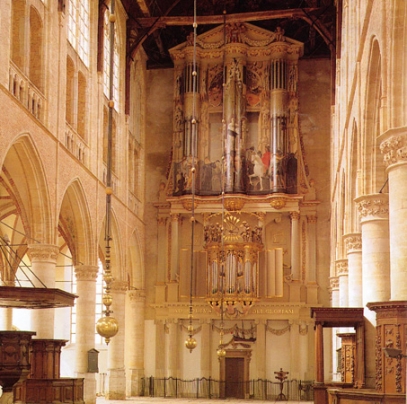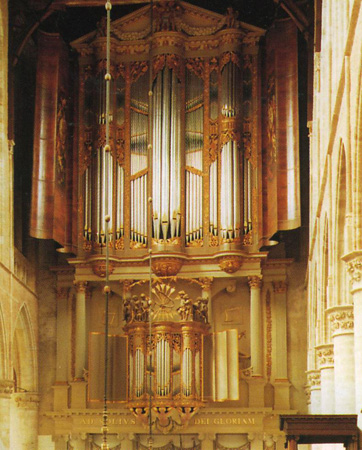


Alkmaar, St. Laurens
Germer Galtuszoon van Hagerbeer 1638-1645, enlarged by Roelof and Johannes Duyschot in 1685 and 1704, and Frans Caspar Schnitger in 1723-1725.
State of preservation: Case designed by Jacob van
Campen in 1645; most pipes original. Repairs and minor modernisations in 1782, 1794, 1809, 1823, 1854 und
1898; electric blower 1921. In 1982-1986 Restoration by Flentrop.
The Alkmaar organ is considered one of the most important organ monuments in Europe, despite its turbulent history. One remarkable feature is the rich amount of ranks dating back to the period of the mid 17th century, another is the preservation of Frans Caspar Schnitger's reed stops (the Basuin and Trompets apart) even including their resonators which usually got changed or lost over the centuries almost without exceptions.
Music sample:
Dietrich Buxtehude (1637-1707) : Praeludium in C, BuxWV 137
played by Hans van Nieuwkoop
Specification:
III+P; manuals C-d3, pedal C-d1
HW:
Praestant 16’ (1645/1725)
Praestant 8’ (1645)
Praestantquint 6’ (1645/1782/1986)
Octaav 4’ (1645)
Quinta 3’ (1986)
Octaav 2’ (1645)
Flachfluit 2’ (1645)
Ruyschpyp 2f. (1645)
Tertiaan 2f. (1725)
Mixtuur 6f. (1986)
Trompet 16’ (1725)
Viool di Gamba 8’ (1725)
Trompet 4’ (1725, resonators 1986)
RP:
Praestant 8’ (1645/1725/1782)
Quintadena 8’ (1645)
Octaav 4’ (1725)
Fluit 4’ (1645/1725)
Nasaat 3’ (1725)
Quintfluit 3’ (1986)
Superoctaav 2’ (1725)
Waldfluit 2’ (1645)
Quintanus 1½’ (1725)
Sesquialtera 2f. (1725)
Mixtuur 5-6f. (1725)
Cimbel 3f. (1725)
Trompet 8’ (1725/1782)
Fagot 8’ (1725)
Vox humana 8’ (1725)
Bovenwerk (OW):
Praestant 8’ (1645)
Baarpyp 8’ (1685)
Rohrfluit 8’ (1725)
Quintadena 8’ (1645/1725)
Octaav 4’ (1645)
Fluit Dous 4’ (1645)
Spitsfluit 3’ (1725)
Superoctaav 2’ (1645)
Speelfluit 2’ (1725)
Sexquialtera 2f. (1725)
Scherp 4f. (1725)
Cimbel 3f. (1725)
Trompet 8’ (1725)
Haubois 8’ (1725)
Vox humana 8’ (1725)
P:
Principal 22’ (32’ from G) (1645/1725/1986)
Praestant 16’ (1645)
Rohrquint 12’ (1645)
Octaav 8’ (1645)
Quinta 6’ (1645)
Octaav 4’ (1645)
Nachthoorn 2’ (1725)
Ruyschpyp 3f. (1725)
Mixtuur 8f. (1725/1986)
Basuin 16’ (1725, resonators 1854)
Trompet 8’ (1725, resonators 1854)
Trompet 4’ (1725, resonators 1854)
Cornet 2’ (1725)
Couplers: HW/RP, OW/RP, OW/HW, HW/P, RP/P
© Greifenberger Institut für Musikinstrumentenkunde | info@greifenberger-institut.de





